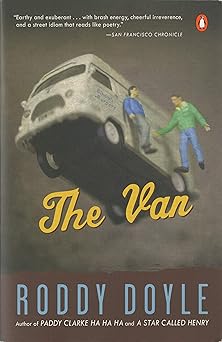
Life can be tough, can’t it? It’s easy to get stuck in a rut, to feel lost and unsure of what comes next. I’ve seen it happen to so many people I know, that feeling of being adrift when things you thought were permanent suddenly disappear. That’s exactly where Jimmy Rabitte, Sr. finds himself. He's out of work, and the days stretch out long and lonely. It's a familiar feeling, that quiet despair of not having a purpose, of feeling like you’re just…existing. There's a sadness in those early chapters, a palpable sense of disappointment that settles over you as you walk alongside him. I remember my own father, after a long career, feeling a similar kind of disorientation. It wasn’t just about the money, of course. It was about identity, about feeling useful, about having a place in the world. Seeing Jimmy grapple with that feeling, that loss of direction, really resonated with me. It’s a universal experience, that feeling of being unexpectedly knocked off course, and it’s so honestly portrayed. He’s not a bad man, Jimmy, just a man struggling to find his footing in a world that’s shifted beneath him. His best friend, Bimbo, finds himself in the same boat when he loses his job too, and their shared misery becomes a strange kind of comfort. They commiserate, they complain, they just…are miserable together. It's that shared understanding, that quiet acknowledgement of a shared hardship, that makes their friendship so touching. Seeing them try to navigate this new reality, with humor and a stubborn refusal to give up, is a really beautiful thing. The story isn't just about losing a job, it's about finding connection, about clinging to what matters when everything else feels uncertain.
Then, things take a wonderfully chaotic turn. With a spark of hope and a hefty dose of desperation, Jimmy and Bimbo decide to become fish-and-chips vendors. They buy an old, rundown van and transform it into a mobile kitchen, serving up greasy, affordable food to anyone who’s hungry or looking for a bit of a buzz. It’s a completely ridiculous idea, really, but it’s also full of heart. Suddenly, they have a purpose, a project, a reason to get out of bed in the morning. But running a food van isn't easy, especially when you’ve got rivals and the environmental health officers breathing down your necks! There are mishaps, close calls, and plenty of laughter along the way. It’s a whirlwind of activity, a constant juggling act of keeping the van running, the customers happy, and the authorities at bay. Watching them try to navigate this new venture, with its own unique set of challenges, is both hilarious and heartwarming. The story is set against the backdrop of a very specific time in Irish history – the period when the country experienced a wave of optimism and pride following some surprising successes in the World Cup. It's a time of celebration and excitement, and the contrast between that national mood and Jimmy and Bimbo's struggles is really striking. The story manages to capture the feeling of that era so well, the sense of hope and possibility that seemed to hang in the air.
Ultimately, this is a story about friendship, family, and finding joy in unexpected places. It's about two men, down on their luck, finding a way to laugh their way through adversity. It’s not a grand, sweeping epic; it's a small, intimate story about ordinary people facing extraordinary circumstances. It's a reminder that even when things seem bleak, there's always room for hope, for laughter, and for the enduring power of human connection. And it’s a wonderful, honest look at what it means to be a man, to be a friend, and to navigate the ups and downs of life with a good sense of humor. You’re rooting for them every step of the way, celebrating their small victories and feeling for them during their setbacks. It's a story that will stay with you long after you’re finished reading it, a reminder that even in the darkest of times, there's always something to smile about.
Rating: 5.0 / 5.0
This is a gentle story about ordinary men facing difficult times. It begins with a quiet sadness, a feeling of being lost when familiar routines disappear. It’s a feeling many of us understand, that sense of uncertainty when life throws unexpected curveballs. Watching these characters struggle with that feeling of displacement is deeply relatable, and the story handles it with such care and empathy. Then, things take a surprising turn, and the shift in tone is wonderfully uplifting. The humor is warm and genuine, and the situations, while often chaotic, are always grounded in a deep sense of human connection. It's a reminder that even when facing adversity, laughter and friendship can be powerful sources of strength. It's not a complicated read, and its charm lies in its simplicity and honesty. It’s a comforting story, a gentle hug for the soul.